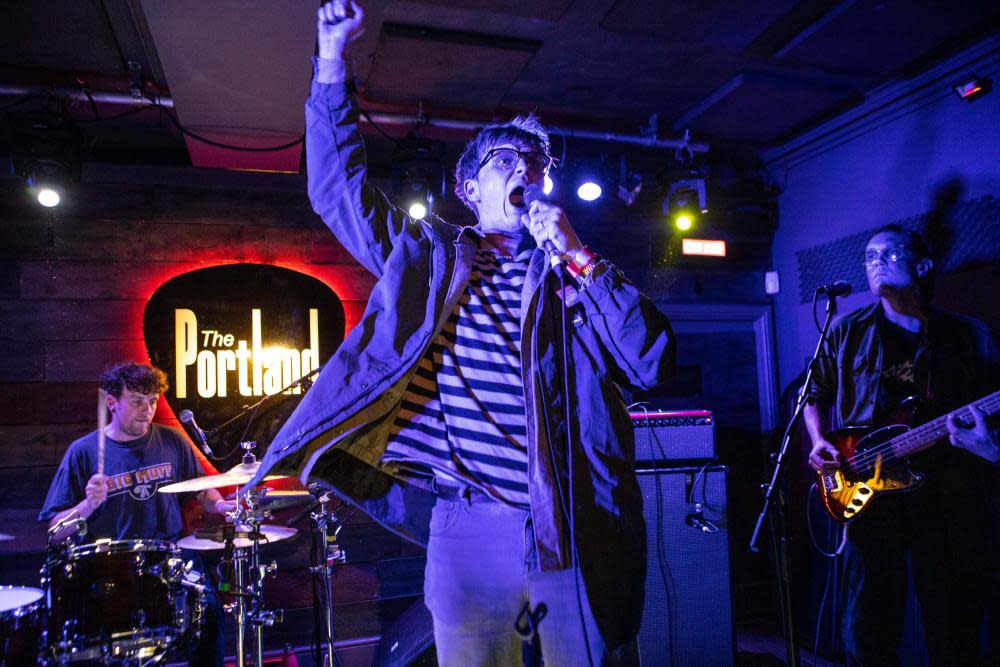Yard Act review – spiky chroniclers of sour times

“It’s a never-ending cycle of abuse!” snarls Yard Act frontman James Smith at his bass player, eking out a funk rhythm. “I got the blues and I can’t shake them loose!” The song is Dark Days – a sinuous banger in which Smith, spittle-flecked, works a botched arrest, some mink carcasses and the reinvention of the wheel into a snapshot of contemporary Britain.
Despite its title, Dark Days is actually a lot of fun: across the stage, mustachioed guitarist Sam Shipstone lets rip a surf-guitar solo. His wrist is strapped up; Smith later reveals it’s broken in two places. Unperturbed, Shipstone coaxes wayward blizzards out of his instrument all night, inspiring a bijou but committed moshpit in this pub backroom.
It might be a Monday night in Cambridge, but there is an air of undeniable momentum around Yard Act, a four-piece from Leeds. Barely 18 months old, on their debut headlining tour of the UK, they’ve just won a prize, the Anchor, at a Dutch music festival, judged by Tony Visconti among others. BBC 6 Music have been hammering their songs for months. Most of this tour is sold out, as are swathes of their next jaunt, around larger venues, this coming February.
Yard Act’s debut album, The Overload, is due in early January. When it was announced, it immediately racked up 2,000 preorders, a giddy-making number these days for a guitar band still technically in embryo. They’re also on the soundtrack for Fifa 2022 (out this week), which means millions of people not just outside, but entirely unaware of, our domestic indie rock bubble will hear their music.
The parallels with the first post-punk era, when a Conservative government presided over dark days, is hard to ignore
The pandemic dealt a heavy blow to scores of artists last year. Not so Yard Act, who had only just graduated from the status of idle threat to the rehearsal room when lockdown hit. A handful of acerbic, oblique tracks – The Trapper’s Pelts, Peanuts, Fixer Upper, Dark Days, all of which sound tremendous live – introduced not just the latest in a fertile line of promising new British post-punk acts, but one whose wit and bile arrived with sprung heels and an air of mischief.
Although Smith shares a surname and a love of barking non sequiturs with the venerable Mark E Smith of the Fall, the first iteration of Yard Act involved a drum machine. As a result, the Act have more than a little in common tonight with Nottingham’s rave-rant kings Sleaford Mods than some of their more dour no wave fellow travellers. There are echoes here, too, of another Yorkshire band who made everyday indignities danceable: Pulp. Featuring lengthy spoken-word passages, there’s also shared territory with peers such as Dry Cleaning and Black Country, New Road – two more names from 2021’s wordy, angular roll of honour.
Key to all these bands is granular detail, and guitar music that refuses to stay in its lane. The parallels with the first post-punk era, when a hegemonic Conservative government presided over dark days, is hard to ignore.
Perhaps Yard Act’s best-known song, Fixer Upper, is unleashed early in the set – a dissonant disco stomper with a guitar line that could remove dental plaque at 30 paces. If many of Smith’s lyrics are short stories (a novella version of their early singles is apparently in the works), Fixer Upper is their most fleshed-out character study. “Graham” has just moved into the neighbourhood. Quick to call builders cowboys, quick to eye-roll at hard-to-pronounce surnames, overly proud of his status as a “two-home owner”, Graham is Brexit Bloke; about one-third of the audience know his every word. Smith’s takedown is nuanced and wry, rather than vitriolic. “We’re gonna put pound-shop terracotta frogs everywhere!” beams “Graham”.
This is the sort of venue where repartee is inevitable, even if Smith didn’t call for requests from the very start. Inspired, he confides, by the Goosebumps choose-your-own-adventure children’s books, the set list on the floor is largely blank, save for Strip, Yard Act’s instrumental opener, and three as-yet-unreleased album tracks.
The most immediate is Dead Horse, a sweary examination of core British values – the nation’s sense of humour, our music, the conversation – that might not survive these trying times. Or that might not be what it’s about at all – there is a messy open-endedness to Smith’s verbiage, one where lettuces grow in potholes (Payday, on its live debut), or where “the palms greased are never on the ends of the elbows digging the graves of the recently deceased” (Land of the Blind).
At the end of Land of the Blind, the song’s character offers to make a 50p piece – and himself – disappear. Smith does just that, picking up his coat and wading through the crowd as the other three-quarters of Yard Act provide pumping exit music.

 Yahoo News
Yahoo News 
